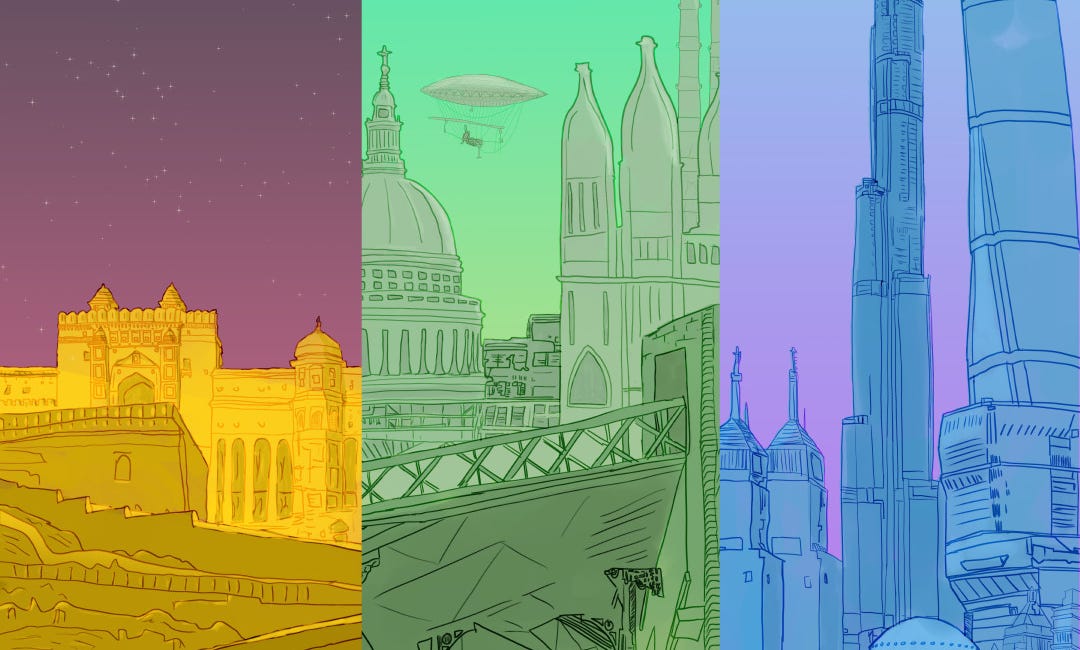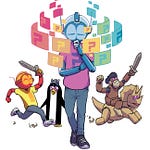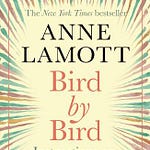On Saturday evening I had an impromptu conversation with
and . We each read a piece of our writing, and then have a good old chat. Today’s video is a slightly edited and whittled-down version of that conversation.The readings:
An excerpt from ‘The Writer’ by me, from Tales from the Triverse. You can read the whole thing here.
An excerpt from In Judgment Of Others by Eleanor. You can buy it here.
An excerpt from The Memory of my Shadow by Ben. More on that one here.
This originally went out live, which is always a fun time. You can come along to these things and ask questions in the chat, if you have the Substack app. Keep an eye out for future livestream notifications, if that’s your sort of thing.
We covered a lot of ground in the conversation.
Mundanity in genre fiction
Picking a story to read from Triverse was a tricky proposition. We didn’t want to spend ages on our readings, so I needed something that would take about 3-to-4 minutes. That’s shorter than a single chapter, which tend to clock in around 10 minutes of reading time.
I wanted it to be something self-contained, and
suggested I look at my bonus chapter, or the one-shots. That gravitated me towards ‘The Writer’, which is a single chapter mini-story about a disgruntled science fiction writer in the future who laments that the scifi genre has become meaningless, given that it’s all become fact.1It was a good choice, in that it goes fairly under-the-radar in its genre trappings. The writer, John Pierson,2 lives in New York in the year 2520. He had enormous success with his first book,3 twenty years earlier, and has been unable to follow it up. He’s an angry man, who has found himself trapped in a box by readers and critics. The chapter explores his interiority and has a small scope, making it far more approachable for someone brand new to the series.
Eleanor’s point about the mundane being essential to the speculative genres is on point: that’s what builds verisimilitude, and grounds everything else. It’s far easier to have AI megaships and fire-breathing dragons if you also drop in some details about breakfast and taxis.
Unhealthy measures of success
Creative pursuits are difficult to quantify, which makes them vulnerable to a sort of insidious scope creep. What begins as a simple, fuzzy “I want to write a story!” can drift towards other ambitions, like being published, or winning the Booker Prize, or having hundreds of paying subscribers.
There’s nothing wrong with ambition, of course, but if it’s approached in the wrong way it can make you absolutely miserable. As this newsletter has grown, I’ve had to contend with that: it’s a good problem to have, obviously, and I’m not complaining, but it does require concentration to stay focused on the original target and not become distracted by shinier numbers.
Getting over our Englishness
Presumably not an issue for Ben, but Eleanor and I both acknowledge the oddness that is a self-promoting English person. There’s something inherent to the culture here that constructs a sort of shame around any form of success. It’s not quite that: success is fine, it’s just that you mustn’t talk about it. It is uncouth.
This is something I’ve had to unlearn. The first time I did an author event that was explicitly about me and my book No Adults Allowed (rather than a more generic panel or workshop about craft), I had to get past my general discomfort. The idea that lots of people are in a room to hear specifically about something I did still strikes me as bizarre.
Over a decade back I did some communications training with a very Californian guy called John Bates. He’s trained TED speakers. He’s loud, bold, very American, and everyone attending the session had to brace themselves at the start. It turned out to be the most valuable professional training I’ve done, though, partly reprogramming my brain to be more at ease with talking about myself and my achievements.
It’s always worth remembering how we feel about accomplishments by our friends. It makes us feel good! It’s rewarding in its own way to congratulate them. The English thing to bat the compliment away, to diminish it, is in fact a rudeness all its own. It makes everyone feel awkward. Far better to accept a compliment.
Precisely observed character details in Eleanor’s writing
In listening to the audiobook of Eleanor’s novel Fallout, I’ve marvelled at her attention to detail. She’s able to build character through minute observations, often layered with subtext. A single glance, or simply making breakfast, or an innocuous line of dialogue, become laden with meaning.
Eleanor referenced Bird by Bird by Anne Lamont, specifically the chapter ‘Short assignments’ in which she introduces the ide of the one-inch frame as a way of focusing. Coincidentally I bought a copy of Bird by Bird a couple of days before, having never read it — I’m looking forward to reading more.
Deus ex draconis
The boundaries of stories always fascinate me. The semi-arbitrary edges to what is possible within the story context.
A story set in 1980s London has particular limits on what can happen.
A story set in an alternate 1970s London where portals have opened to other worlds has a different set of limits.
There are always limits, though. Eleanor wondered about a dragon walking in on a scene and upending the narrative: something that could theoretically happen in Tale from the Triverse, but which would be a surprising occurrence in In Judgment of Others or The Memory of My Shadow.
Except it’s never quite that simple. Stories have to have boundaries, otherwise there’s nothing for the audience to hold on to. Stories become too slippery, too random, if there are no edges to the event possibilities.
Thanks for reading and watching! And please do check out Eleanor and Ben’s work when you get a chance. And if you haven’t tried Tales from the Triverse, you can jump in here:
Tales from the Triverse story index
If you’re looking for my non-fiction writing guides, video tutorials and community discussions, you can find the most popular articles here!
This is a theme we touched upon after Ben’s reading. His story is about AI, and was written largely before the current AI hype boom. Same with my story No Adults Allowed, and even Triverse, both of which feature AI as major plot and character elements. It’s odd to be writing about something fictional that then becomes fact during the writing process.
Interesting sidenote for anyone interested in the wider Triverse lore: while John Pierson only appears in ‘The Writer’ and isn’t directly connected to any other characters or storylines, he’s actually a pivotal figure in the wider picture. Pierson’s frustrations led him (after the events of ‘The Writer’) to write a science fiction novel called The Plunge, into which he poured all of his malice for the world that had wronged him. It’s a political treatise disguised as fiction, a conspiracy-ridden fantasy depicting an alternate world where man (yes, man specifically) has more control over his own destiny, free from the shackles of societal order. It’s a trashy book, but one that becomes a bible of sorts, a clarion call, for the disgruntled and power-hungry. It’s no surprise that the antagonists in Triverse all have a copy. Pierson, after his death, is seen as a disruptive prophet. Feel free to make analogies to certain real world 20th and 21st century writers.
Having people still reading books in 2520 is probably the biggest flex in Triverse.
















